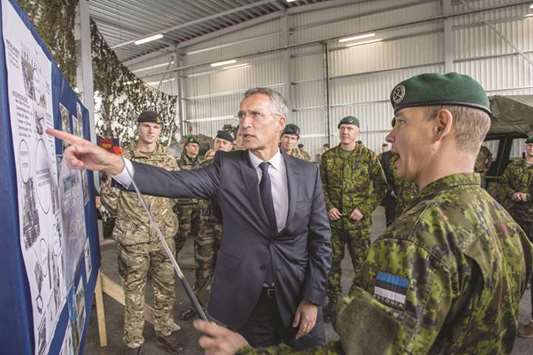Russia’s military chief has brushed off North Atlantic Treaty Organisation (Nato) concerns about Moscow’s war games with Belarus next week at a rare meeting with a senior commander from the US-led alliance.
The Russian defence ministry said Chief of the General Staff Valery Gerasimov told Petr Pavel, chairman of Nato’s Military Committee that the joint exercises with Belarus were “long-planned and defensive” and “not aimed against any third country”.
“Gerasimov focused attention on the main aim of the training – the defence” of Russia and Belarus, a statement carried by Russian news agencies said after the meeting in Azerbaijan.
Nato said that the meeting “demonstrates a clear mutual interest to maintain the military lines of communication”, but did not give any details on what was discussed.
The joint “Zapad-2017” Russian exercises with Belarus next week have stirred unease in Poland and the Baltic States.
Moscow says the event will involve about 12,700 troops, but Lithuania and Estonia have said as many as 100,000 soldiers could take part.
Germany has also disputed Moscow’s version that only 13,000 Russian and Belarussian servicemen would participate.
“It is undisputed that we are seeing a demonstration of capabilities and power of the Russians,” German Defence Minister Ursula von der Leyen told reporters at an EU defence ministers’ meeting in Tallinn.
“Anyone who doubts that only has to look at the high numbers of participating forces in the Zapad exercise: more than one hundred thousand,” she said in a joint news conference with her French counterpart Florence Parly.
Parly condemned the coming drills on the border of the EU and Nato as a deliberate “strategy of intimidation”.
Nato chief Jens Stoltenberg said on Wednesday that he saw no “imminent threat”, but added that the alliance would be “monitoring the activity closely”.
Western officials have said the preparations for Zapad suggest it could be much bigger than Moscow has suggested, and Stoltenberg said the degree of openness about the drills did not meet international standards.
Three Nato experts have been invited to attend as observers, but Stoltenberg said this “fell short of the transparency required by the Organisation for Security and Co-operation in Europe (OSCE)”.
Suspicions are high between Nato and Russia, with the alliance’s eastern members worried about Moscow’s increasing assertiveness after it seized Ukraine’s Crimean peninsula in 2014.
Moscow has long railed against Nato expansion in its former sphere of influence.
Nato has deployed four battle groups – around 4,000 troops – to Estonia, Lithuania, Latvia and Poland in recent years.
The meeting in Baku came after Pavel and Gerasimov spoke by phone in March, the first talks between military chiefs of both sides since ties collapsed over the crisis in Ukraine.
Nato severed military contacts with Moscow over its meddling in its ex-Soviet neighbour but diplomats and civilian leaders from the two sides continued to meet.

Stoltenberg is seen during his visit to the Nato battle group in Estonia’s Tapa military base.
